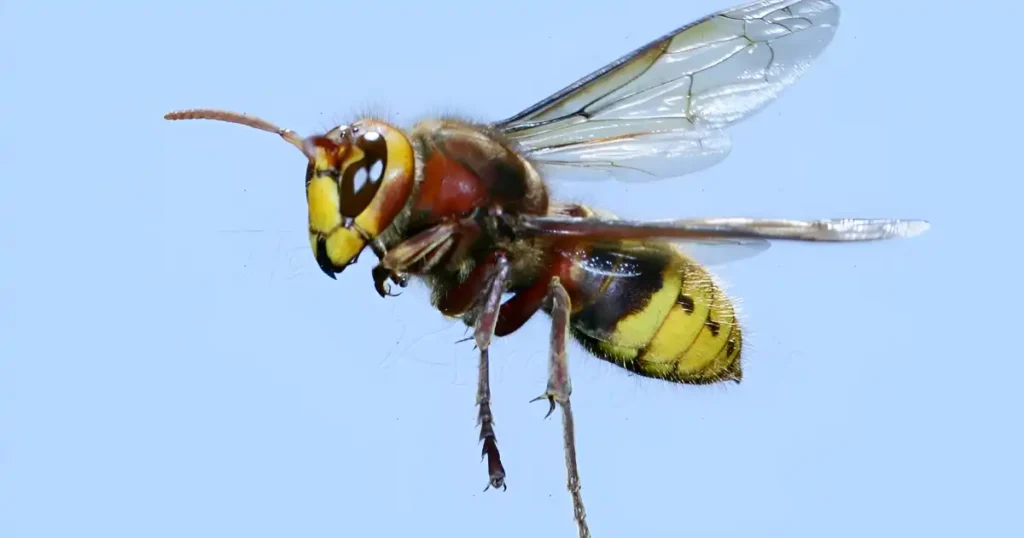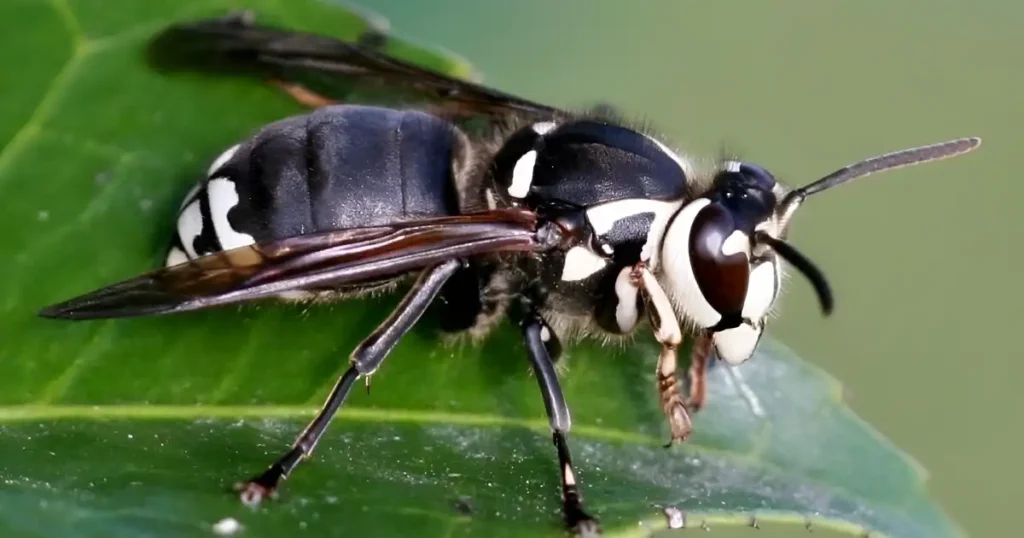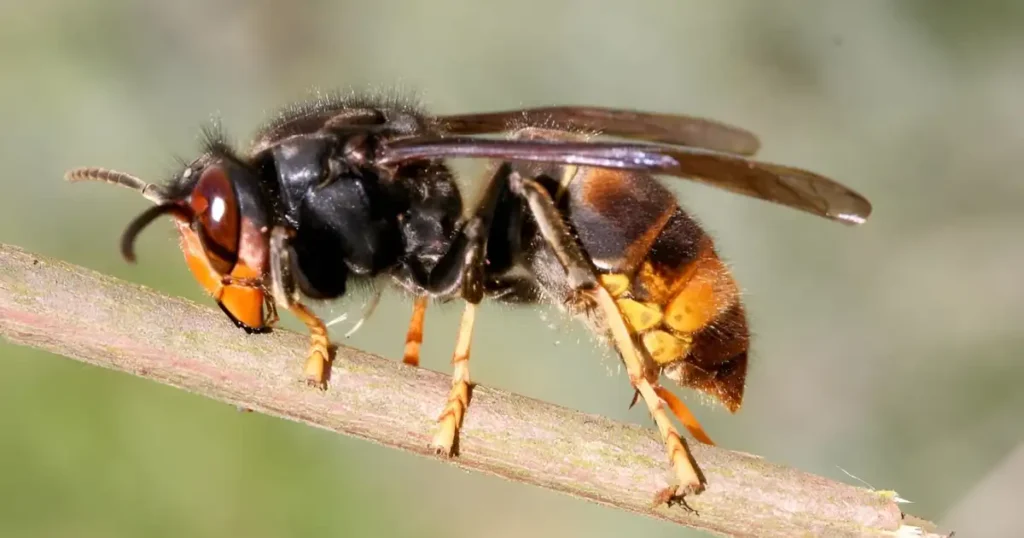
Hornets are an insect in the family Vespidae. They are known for their stingers and painful venomous bites. There are many types of hornets, each with unique characteristics and habitats.
One of the most well-known types of hornets is the European hornet. This species has been introduced to North America, as it is native to Europe. European hornets are larger than most other types and color brown and yellow. Known for their aggressive behavior, European hornets can be dangerous to humans.
Another type of hornet is the Asian giant hornet. This species is native to Asia and is the largest hornet in the world, with some individuals reaching up to 2 inches in length. Asian giant hornets are known for their powerful stingers and toxic venom, which can be deadly to humans. They can wipe out entire colonies of honeybees in hours, so they are also known for their destructive behavior.

You can distinguish different hornets from other types of wasps by their large size, ranging from 0.75 to 2 inches in length. The black and yellow striped pattern on their abdomen, with a reddish-brown thorax, makes them easy to tell apart. Some hornets, such as the bald-faced hornet, have mostly black bodies with white markings on their faces and abdomen.
Hornets have two pairs of wings, six legs, and powerful mandibles that they use to capture prey and defend their nests. Their smooth stingers can be used repeatedly, making them formidable opponents to potential predators.
Different hornets can be found worldwide, with different species inhabiting different regions. The European hornet, the bald-faced hornet, and the Asian giant hornet are some of the most common species.
European hornets are found throughout Europe and Asia, while bald-faced hornets are found in North America. The Asian great hornet has been spotted in North America in recent years, despite being native to Asia, and has been nicknamed the "murder hornet."
Different hornets typically build their nests in trees, shrubs, or on the sides of buildings. They live in large colonies, with a queen hornet laying eggs and workers caring for the nest and gathering food; they are social insects.
Overall, hornets are fascinating insects with unique characteristics that distinguish them from other types of wasps. Their stings can be painful and even dangerous for those with allergies, so it's key to be cautious around them.

Powerful stingers and painful stings are things that hornets, which are a type of wasp, are known for. Worldwide, there are many different types of hornets and each one has its unique characteristics and behaviors. This section will list some of the most common species of hornets.
Also known as the "murder hornet," the Asian giant hornet is the largest species of hornet in the world. It can grow up to 2 inches long and have a wingspan of up to 3 inches. These hornets are native to Asia and are known for their aggressive behavior and powerful sting. Their potent venom can cause serious health problems, including death in some cases.
The European hornet is a large species of hornet that can be found in parts of North America despite being native to Europe. They are typically brown or black with yellow stripes and can grow up to 1.5 inches long. These hornets can behave aggressively and can pose a danger to humans, especially those who are allergic to their venom.
The bald-faced hornet, also known as the white-faced hornet, is a type of yellow jacket that is found in North America. Their colors are black with white markings, and they can grow up to 0.75 inches long. These hornets can behave aggressively and pose a danger to humans, especially those who are allergic to their venom.
In conclusion, worldwide, there are many different types of hornets, and each species has unique characteristics and behaviors. The Asian giant hornet, European hornet, and bald-faced hornet are just a few of the most common species of hornets. It is important to be cautious around these insects and seek medical attention if you are stung.

Different types of hornets have varying nesting habits. For example, the European hornet typically builds its nest in hollow trees, while the bald-faced hornet constructs its nest in trees, bushes, or on buildings. The Asian giant hornet, on the other hand, builds its nest underground or in tree roots.
Hornets are known for their aggressive behavior when protecting their nests. They will attack any perceived threat and can sting multiple times, making them a danger to humans and animals alike. To prevent getting stung, it is important to avoid disturbing hornet nests.
Hornets are predators and feed on various insects, including other bees and wasps. They also consume nectar and sap from plants. The European hornet is known to prey on honeybees, while the Asian giant hornet is notorious for attacking and decimating entire honeybee colonies.
Hornets are important predators in their ecosystems and help control insect populations. However, they are considered a pest in certain situations because they are known to behave aggressively and can pose a danger to humans.
In conclusion, understanding the behavior and ecology of hornets is important for managing and controlling their populations. Taking precautions when dealing with hornets is essential to avoid getting stung.

Hornets can be a cause for concern when it comes to human interaction. Different types of hornets have varying levels of sting and venom potency. For example, the Asian giant hornet, also known as the "murder hornet," has a potent venom that can cause severe pain, swelling, and even death in some cases. On the other hand, the European hornet has a less potent venom that is comparable to that of a honeybee.
It is important to note that hornets will only sting if their nest is disturbed or they perceive a threat. It is best to avoid getting too close to a hornet nest and to seek professional help if a nest needs to be removed.
Due to hornets' potential danger, it is important to take measures to control and prevent their presence. This can include sealing building openings, removing potential food sources, and using traps or pesticides.
Using pesticides can also harm beneficial insects such as bees and butterflies, so caution is key. Therefore, hiring a wildlife professional when dealing with a hornet infestation is recommended.
While hornets can pose a risk to humans, taking preventative measures and contacting wildlife professionals will minimize their impact.
Hornet invasions can be very dangerous and it is strongly recommended that you do not try to deal with them yourself. If this is a problem you’re facing, Critter Stop can help you solve it safely, quickly, and for good. We service residential & commercial customers in Texas, have a five-star reputation, and offer industry-leading guarantees. Contact Us now at (214) 234-2616 and book a free inspection and estimate today!
Hornets and wasps belong to the same family of insects, but there are some aspects in which they are notably different. Hornets are generally larger than wasps, have a more robust body, and a distinct color pattern. Wasps, on the other hand, tend to be slimmer and have a more elongated body. Additionally, hornets are known for their aggressive behavior, while wasps are generally less aggressive.
Different species of hornets have distinct physical characteristics that make them easily identifiable. For example, the Asian giant hornet has a large body, a distinct yellow head, and a black thorax. The European hornet, on the other hand, has a brown and yellow body with a dark abdomen. It is important to note that hornets can vary in appearance based on their location and environment.
The Asian giant hornet is known for behaving aggressively and is considered the most dangerous hornet species. Its venom can be lethal, and it is known to attack in large numbers.
Yes, online there are many resources available that provide visual identification guides for both wasps and hornets. These guides can help individuals identify different species of hornets and wasps based on their physical characteristics.
Different species of hornets can be found in a variety of habitats, including fields, urban areas, and forests. Some species, like the European hornet, prefer to build their nests in trees, while others, like the bald-faced hornet, build their nests on buildings and other man-made structures.
Hornets are generally more aggressive than wasps and are known for their territorial behavior. They will defend their nests aggressively and can attack in large numbers if they feel threatened. Wasps, on the other hand, are generally less aggressive and will only attack if they feel their nest is being threatened.
Visit our Critter Library and learn more about our furry friends